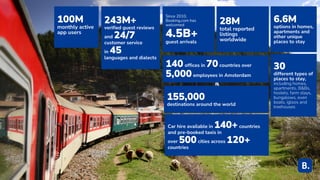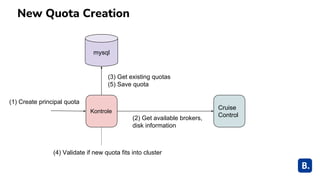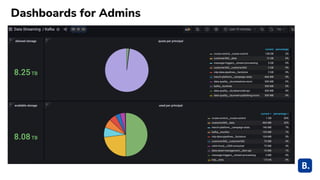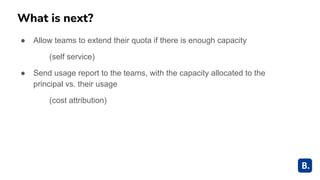Storage Capacity Management on Multi-tenant Kafka Cluster with Nurettin Omeroglu
"I will be presenting how we do the smart/automated capacity management on Multi-tenant Kafka cluster in Booking.com. It was a long journey. In this end to end story, I will be presenting what the issues were at the beginning, how we came up with a plan, designed, implemented, and applied to our existing clusters smoothly, now how the clients can monitor and even get alerted before their reserved capacity has been reached. What were the challenges and our learnings? What is next? Why? In Booking.com, the infra team manages 60 different Kafka clusters with hundreds of topics in each. There are clusters running with hundred brokers. As there are hundreds of Kafka clients from tens of different departments, it is high likely some of the clients start abusing the cluster. Especially during peak times, when the retention was set as retention.ms, or when the underlying message size changes, it is hard to predict what would be the occupied storage in total. Finding the relevant clients, deciding which data to discard, dealing with so many unknowns in a short period of time can be hassle. Also these are not fun activities but just a toil for the team. What? To avoid such boring issues, the team has chosen the path to build a smart mechanism and have quotas in place. It helped saving time developing new features instead of chasing people to resolve collisions. You can think that as an extension to the built-in throttling producer/consumer rate limits provided by the Apache Kafka, but it is much more than that. There are several components will be explained during the presentation one of them is our control plane (custom built) which manages the communication between clients and servers and does many things automated. Another one is the Custom Policies that we plugged in on the Kafka side to validate the configuration even tried (malicious configuration) on the server side. The talk guarantees learning and shows examples of Kafka at scale problems in Booking.com."




























Recommended


























































More Related Content
What's hot (20)






































Similar to Storage Capacity Management on Multi-tenant Kafka Cluster with Nurettin Omeroglu (20)








































More from HostedbyConfluent (20)








































Recently uploaded (20)






































Storage Capacity Management on Multi-tenant Kafka Cluster with Nurettin Omeroglu
- 2. What happens when broker disk is FULL? A)Only some producers fail B) C) All producers fail Kafka service fails
- 3. Streaming Infra Team Nurettin OMEROGLU Senior Software Engineer I am a member of Streaming Infra Team (10 people) and have more than 4 years of expertise on Apache Kafka client and server side components. We manage on-prem Kafka solution serving to clients running on variety of platforms such as bare-metal, kubernetes and also Cloud
- 4. Agenda 1. Introduction 2. Before the project 3. Step by step capacity project 4. Future plans
- 5. Introduction
- 6. 100M monthly active app users 155,000 destinations around the world Car hire available in 140+countries and pre-booked taxis in over 500cities across 120+ countries 243M+ verified guest reviews and 24/7 customer service in 45 languages and dialects Since 2010, Booking.com has welcomed 4.5B+ guest arrivals 28M total reported listings worldwide 6.6M options in homes, apartments and other unique places to stay 30 different types of places to stay, including homes, apartments, B&Bs, hostels, farm stays, bungalows, even boats, igloos and treehouses 140offices in 70countries over 5,000employees in Amsterdam
- 7. Payments A/B Tests MySQL Cassandra Hadoop Cloud ... Events Logs Online ML Fraud detection Personalization Bookings FPA reporting Data Streaming Platform MySQL Cassandra Hadoop Cloud ... ● Transports and transposes data via pub/sub; ● Connects application through data pipeline ● Resilient, scalable, fault tolerant, secure, with SLO guarantees; Real-time analytics
- 8. Scale of Streaming @Booking.com How much data? ~2.2PB produced and consumed per day How many clusters? 62 How many topics? ~34K How many partitions? ~138K How many servers? 900 kafka brokers +75 zk
- 10. Setup ● On-premise multi-tenant kafka clusters running on bare-metal ● Local SSD storage (~3.5TB per broker) ● 32 thread CPU / 256MB memory / 10 Gb network
- 11. Existing Components ● Custom Configuration validations ● Custom Quota validations ○ Topics per principal ○ Partitions per principal … ● Topics ● Custom quotas (booking-specific) … ● Specific Configurations ● Custom Quotas … ● Custom PrincipalBuilder ● Custom Policies (AbstractPolicy) ○ AlterConfigPolicy ○ CreateTopicPolicy … Mysql (Metadata Store) Bkstreaming CLI (Self-service, home-built) Kontrole (Control Center, home-built) Kafka Cluster
- 12. Example Scenario for Custom Quota Validations (2) Auth: OK (3) Topics per principal quota: OK (4) Partitions per principal quota: OK (1) Add topic for a service (5) Create topic Mysql (Metadata Store) Kontrole (Control Center) Kafka Cluster
- 13. Reactive Approach ● Clients use retention.ms configuration retention.ms - which deletes messages after a certain amount of time. ● Dangerous situations if traffic spikes ● We were the middleman handling the toil / issues between multiple tenants ○ Increase number of brokers, or ○ Determine noisy neighbors and ■ Throttle, or ■ Communicate with clients (night?) ● Lack of visibility and forecasting to plan ahead reserved space for safety Topic 1 Shared broker disk among topics Topic 4 Topic 2 Topic 5 Topic 3 Topic 6
- 14. Step by Step Capacity Project
- 15. IDEA? retention.bytes - which deletes the oldest messages when the total size of a partition exceeds a threshold. ● Reserve storage per principal (quota) ● Let the clients manage their reserved storage ● Make retention.bytes mandatory on topic ● Feedback to clients around their usage/growth Discarded Options: ● Kubernetes elasticity ● Network attached or remote storage options reserved space for safety Reserved quotas per principal Principal quota Principal quota Principal quota
- 16. Determine cluster capacity 1) Periodically fetch information from Cruise Control about the cluster Number of available brokers, disk information … 2) Use min disk capacity among brokers to calculate cluster capacity 3) Target 90% disk usage (headroom) Total capacity = (min broker disk * number of brokers) * 0.9 Kontrole Cruise Control Graphite (1) Periodic cron job (2) Available brokers, disk information (3) Calculate capacity, Publish metrics
- 17. New Quota + Topic level configuration ● Reserve storage per principal (quota) (default 500MB) ● Add property `topic_capacity_bytes` per Kafka topic (not visible to Kafka brokers) to manage retention.bytes ● We do all the calculations under this value (including retention.bytes) topic_capacity_bytes = retention.bytes * partition_count * replica_count ● Whenever there is a partition count increase (i.e. done via Kontrole), retention.bytes (per partition) is re-calculated accordingly.
- 18. New Quota Creation Kontrole Cruise Control mysql (1) Create principal quota (2) Get available brokers, disk information (3) Get existing quotas (5) Save quota (4) Validate if new quota fits into cluster
- 19. New Topic Creation Kontrole mysql (1) Create topic with topic_capacity_bytes (2) Get principal’s quota (3) Enough space for the new topic? (4) No, reject. Ask for quota increase (4) Yes, topic fits, go on! Create topic with relevant retention.bytes Kafka Cluster
- 22. Add Alerting ● Warn/notify before topic_capacity_bytes configuration kicks in and start deleting data. ● Actions: ○ reduce the retention.ms configuration, or ○ increase the topic capacity.
- 23. Onboard Existing Clusters ● Simulating scenarios on test cluster ● Operational documentation ● Stakeholder management ● Documentation for clients ● Enable capacity project on a cluster ○ Calculate / Add topic_capacity_bytes to each topic (with extra) ○ Calculate / Add quotas per principal
- 24. Migration Challenges ● Revert strategy ○ Dynamic flag to disable the project on cluster ● Sanity check if cluster is suitable ○ Brokers may have non-uniform storage capacity ○ With extras, all quotas may not fit into the available capacity
- 25. Future Work
- 26. What is next? ● Allow teams to extend their quota if there is enough capacity (self service) ● Send usage report to the teams, with the capacity allocated to the principal vs. their usage (cost attribution)
- 27. Booking.com Facebook: facebook.com/booking.com Instagram: @bookingcom Twitter: @booking.com; @bookingcomnews Linkedin: nl.linkedin.com/company/booking.com Youtube: youtube.com/booking Join Booking.com as a partner join.booking.com Join the Booking.com team careers.booking.com Questions?
- 28. Thank you!



